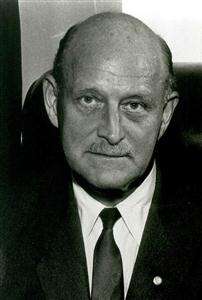Stephen Sanders Chandler Jr.
| Stephen S. Chandler | |
|---|---|
 | |
| Born |
Stephen Sanders Chandler, Jr. September 13, 1899 Blount County, Tennessee |
| Died |
April 27, 1989 New York City |
| Occupation | Attorney, Judge |
| Years active | 1922-1989 |
Stephen Sanders Chandler Jr. (September 13, 1899 – April 27, 1989) was a United States federal judge.
Born in Blount County, Tennessee, Chandler received an LL.B. from the University of Kansas in 1922. He was in private practice in Oklahoma City, Oklahoma from 1922 to 1943, when he was appointed by President Franklin D. Roosevelt to the Western District of Oklahoma. He was named chief judge of that district in 1956, serving on a reduced status part of that time, until his retirement in 1969. He was a member of the law faculty at Oklahoma City University from 1957 to 1960. He was most noted for his role in exposing bribery on the Oklahoma State Supreme Court in 1965-66, which led to major changes in the way Oklahoma chose judges. Judge Chandler died in 1989.
Career
On February 1, 1943, Chandler was nominated by President Franklin D. Roosevelt to a new seat on the United States District Court for the Western District of Oklahoma created by 54 Stat. 219. He was confirmed by the United States Senate on May 10, 1943, and received his commission on May 13, 1943. He served as chief judge from 1956 to 1969, although the Judicial Council of the circuit suspended him from his duties.[lower-alpha 1]
Personal issues
Chandler got into other difficulties on some occasions:
- He testified before a United States Senate subcommittee hearing in 1962 that he was, "...afraid of being poisoned, that his telephone was tapped and that his fellow judges sometimes cursed him."
- Twice he was removed from hearing lawsuits because of allegations of personal interest or bias and prejudice.
- He was indicted by an Oklahoma grand jury in 1965 on charges of conspiring to have his private road paved by the county. The charge was dismissed.
- He once barred the United States Attorney in Oklahoma City and five other Oklahoma City lawyers from practicing in Federal Court. The Federal appeals court overturned the ruling.[1]
Senior status
Chandler assumed senior status on October 20, 1975.[lower-alpha 2] Chandler served in that capacity until his death, in 1989.[2]
Role in exposing Oklahoma Supreme Court scandal (1965)
Judge Chandler worked with Oklahoma Judge William A. Berry to expose corruption on the Oklahoma Supreme Court after reading a confidential testimony by one of the accused justices. He supported Berry's recommendation that they allow Oklahoma lawmaker, G. T. Blankenship, to make a speech about the contents in an open session of the Oklahoma House of Representatives on January 21, 1965. The House soon approved a formal investigation that led to the impeachment and indictment of Justices N. B.Johnson and Earl Welch.[3]
Other activities
Family
Chandler married Margaret Patterson in 1922. She predeceased him (no details provided). They had one daughter and two sons who survived him.[4]
Death
According to the New York Times, Judge Chandler died April 27, 1989 in an unnamed New York city hospital. The cause of death was not stated, but the paper reported that he had been suffering from pneumonia and ulcers. He was survived by a daughter and two sons.[1]
The Tulsa World reported that Chandler had died in Presbyterian Hospital in New York City while being treated for pneumonia and bleeding ulcer for about two weeks. His grandson, Stephen Chandler Sims, told the World that the judge had been treated for a bleeding ulcer during the previous summer.[4]
Notes
- ↑ His obituary in the New York Times said that the Judicial Council had relieved him from his duties for one month, saying that Chandler was "...unable or unwilling to discharge efficiently the duties of his office." He appealed the decision to the Supreme Court, and was reinstated.[1]
- ↑ Senior status meant that he was still eligible to hear cases, but that his case load was greatly reduced.[1]
References
- 1 2 3 4 "U.S. Judge Stephen Chandler, 89; Often Feuded With His Colleagues." New York Times. April 29, 1989. Accessed April 30, 2018.
- ↑ "Chandler, Stephen Sanders, Jr." Biographical Directory of Federal Judges. Accessed April 30, 2018.
- ↑ Howard, Gene. "Gavel to Gavel: 'Supreme' history." Journal Record (Oklahoma City), May 17, 2007. Accessed April 30, 2018.
- 1 2 3 4 "Longtime Federal Judge Stephen Chandler Dies." Tulsa World. April 28, 1989. Accessed May 2, 2018.
Sources
- Stephen Sanders Chandler Jr. at the Biographical Directory of Federal Judges, a public domain publication of the Federal Judicial Center.
| Legal offices | ||
|---|---|---|
| Preceded by new seat |
Judge of the United States District Court for the Western District of Oklahoma 1943–1975 |
Succeeded by Ralph Gordon Thompson |